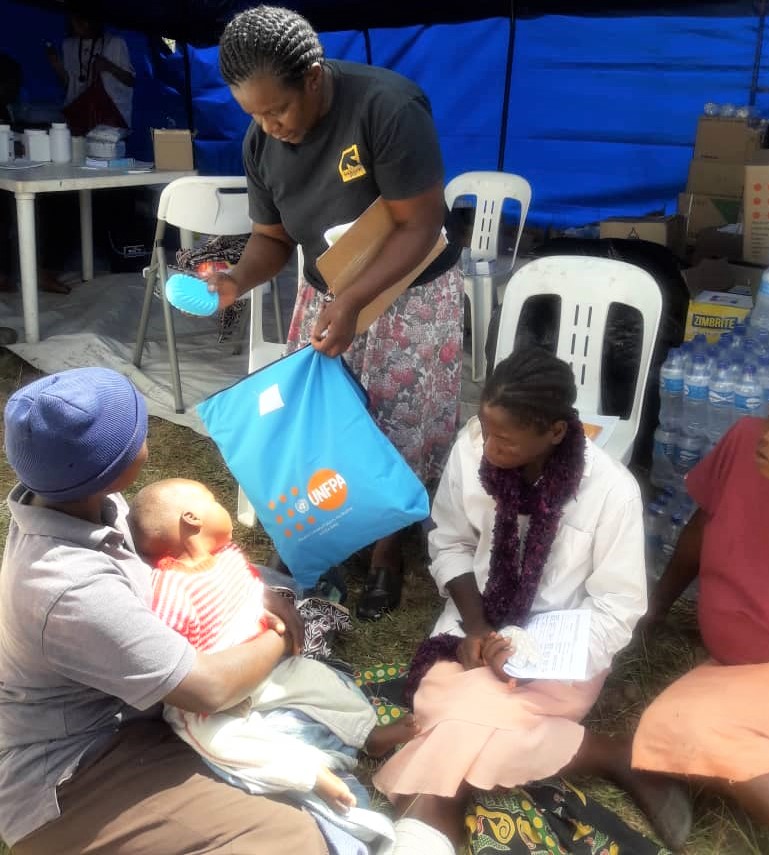
UNFPA Zimbabwe CO is the lead organization for Gender Based Violence and Sexual Reproductive Health in emergencies response, and provides high level technical assistance to the Government of Zimbabwe during slow and rapid onset humanitarian crises, including climate change triggered disasters (drought, floods and cyclones), disease outbreaks and economic hardship related crises.
Responding to GBV in humanitarian situations
The vulnerability of women and girls to GBV is heightened in the Zimbabwean multi-hazard humanitarian crisis, where violence and discrimination related to the emergency has also exacerbated pre-existing, persistent, gender and social inequalities, as well as traditional harmful socio-cultural practices. Women and girls are disproportionately affected by the protection consequences of climate change and economic hardship. In drought-affected areas, women and girls are forced to walk long distances to collect water, facing an increased risk of sexual violence.
Furthermore, the modification of daily routines forces them to spend long hours away from home, generating tensions within the household, and increasing intimate partner violence. Unbalanced power dynamics also exacerbate exposure to sexual exploitation and abuse, as women and girls increasingly resort to trading sex as a means of providing the most basic needs for their families.
The use of lobola (bride price) as an alternative income source is a documented practice in the current context, contributing to an increase in early marriage, while in areas where the Apostolic faith is predominant, communities marry girls at younger ages in the misguided belief that they will somehow appease "spirits" causing drought and economic hardship.
Women and girls with disabilities are among the most vulnerable and are three times more prone to GBV and harmful practices. The impact of the crisis on the health system also causes decreasing availability of clinical management of rape services, affecting timely access to lifesaving support, particularly for those in remote areas. Deprioritization of GBV services also occurs as a consequence of the socio-economic impact of climate change triggered crises and economic hardship.
Ensuring continuation of essential GBV services, as well as setting up community based mechanisms to mitigate the risk of GBV and SEA, and enhancing the capacity of interagency humanitarian actors on GBV preparedness and response in multi-hazard humanitarian contexts such as Zimbabwe, is a critical action within the UNFPA mandate.
UNFPA is the GBV sub-cluster lead, and provides technical support as the chair of the GBV sub-cluster, in collaboration with the MOWACSMED (co-chair), to over 50 GBV sub-cluster partners. This includes UN agencies, international and local NGOs, CSOs, Red Cross and IFRC and Donors on GBViE strategic planning, resource mobilization, capacity building, knowledge management and advocacy. As the first UN agency in Zimbabwe, for mandate and funding, to provide GBV risk mitigation and response in humanitarian crises, UNFPA, through its implementing partners supports:
- GBV risk mitigation initiatives, such as provision of psychosocial support to vulnerable women and girls through safe spaces, distribution of NFIs (dignity kits, menstrual health management)
- Provision of GBV essential services, through static and mobile One Stop Centres in remote and hard to reach areas
- Community-based GBV surveillance, including rapid assessments and data collection on GBV risk exacerbation, service mapping and accessibility constraints, strengthening and context adaptation of referral pathways, survivors’ referrals to lifesaving services, support to the establishment of community-based PSEA complaints mechanisms
- Capacity building of GBV actors on GBViE preparedness and response, GBV risk mitigation and response and PSEA integration across clusters response, in line with the IASC guidelines.
Sexual and Reproductive Health in Emergencies
UNFPA is a partner of the Health Cluster, and the lead UN agency for SRH in emergencies response. Humanitarian crises severely disrupt access to life-saving sexual and reproductive health services. Sexual and Reproductive Health and Rights demand urgent attention. UNFPA works with the inter agency Humanitarian and country team counterparts to develop country preparedness, response and recovery plans. The main focus of UNFPA is in ensuring:
- Continuity of essential emergency services for Reproductive, Maternal, Newborn, Child and Adolescent Health (RMNCAH)
- Supply of contraceptives and emergency reproductive health commodities
- Supporting safe spaces (Maternity Waiting Homes) for pregnant women and young girls
- Strengthening the referral pathway for emergency obstetrics and neonatal care


